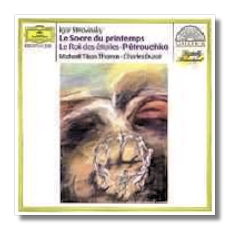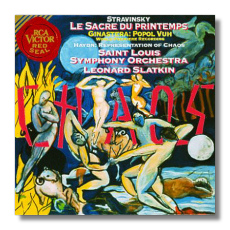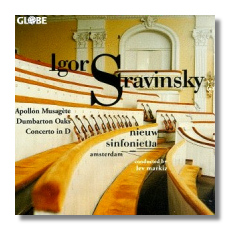
The Internet's Premier Classical Music Source
Related Links
- Stravinsky Reviews
- Latest Reviews
- More Reviews
-
By Composer
-
Collections
DVD & Blu-ray
Books
Concert Reviews
Articles/Interviews
Software
Audio
Search Amazon
Recommended Links
Site News
 CD Review
CD Review
Igor Stravinsky

Orchestral Works
- Rite of Spring
- The King of the Stars
- Pétrouchka
New England Conservatory Chorus
Boston Symphony Orchestra/Michael Tilson Thomas
Tamás Vásáry, piano
London Symphony Orchestra/Charles Dutoit (Pétrouchka)
Deutsche Grammophon 435073 76min


- Rite of Spring
- Franz Joseph Haydn: The Creation: Representation of Chaos
- Alberto Ginastera: Popol Vuh
St. Louis Symphony Orchestra/Leonard Slatkin
RCA 60993 68min


- Apollon Musagete
- Dumbarton Oaks Concerto
- Concerto in D for String Orchestra
Nieuw Sinfonietta Amsterdam/Lev Markiz
Globe 5071 61min
Youthful enthusiasm usually fades in time. Consider Michael Tilson Thomas. When he stepped as a substitute for William Steinberg in the middle of a Boston Symphony concert in 1969 season, I was a teenager who was just beginning to discover classical music. At first I was skeptical of the new conductor, but after hearing his sensuous recording of Debussy's Prélude to the Afternoon of a Faun I was hooked. I quickly purchased all of his available recordings, including The Rite of Spring, a work that was utterly incomprehensible to me until I heard this version. It's been over twenty years since then, and many recordings of the Rite have come and gone. As I put this disc in the player, I wondered whether my enthusiasm might have cooled. I need not have worried.
The Boston Symphony of 1972 was one spectacular instrument – not yet ravaged by years of drudgery under the hapless Seiji Ozawa – and Tilson Thomas played it like a true virtuoso. Not only is his the most colorful Rite on disc, it's by far the most rhythmically vital and thrilling. Tilson Thomas has a way of inflecting the rhythms that calls to mind a giant, but superbly disciplined jazz band, and they really cook in the 'Adoration of the Earth'.
In spite of the conductor's clear emphasis on rhythm and forward motion, he never misses a lovely turn of phrase or a beautiful melodic fragment. Listen, for example, to the tremendously lyrical phrasing in the 'Games of the Rival Tribes'. Nor have I yet heard a more thoroughly integrated interpretation. Each tempo and each phrase in Part One builds to the tremendous climax of the 'Dance of the Earth', while Part Two transports us from the mysterious and beautifully colored introduction to the hair-raising 'Sacrificial Dance.' And if this version of the 'Glorification of the Chosen Victim' doesn't send shivers up your spine, see your doctor immediately.
Gerald Fox (in the January/February 1993 issue of the American Record Guide) praises Benjamin Zander and Yoel Levi for adopting the tempo of Stravinsky's piano roll recording and zipping through the 'Sacrificial Dance' in just about four minutes. With all due respect to Mr. Fox, I find that pace far too frantic. Tilson Thomas takes a slightly more reasonable 4:35, and it sounds absolutely right. DG's analog recording is nothing short of spectacular, with each line of Stravinsky's complex score always clearly audible and a bass drum that will knock you out of your chair.
The King of the Stars is a short, five and one-half minute score for male chorus and orchestra. Although written at about the same time as the Rite, its harmonies look ahead to the Symphonies of Wind Instruments. Tilson Thomas effectively captures the hushed, sensuous mood of the piece.
Dutoit's Pétrouchka, while adequate, is far from outstanding. All too often, he completely misses the vibrant colors and beautiful melodies that are the hallmark of this score. Pacing is dull, and rhythms are flaccid. Pianist Tamás Vásáry provides the only brilliant moments. Indeed, the all-important piano part of this ballet has rarely been so well played (or given such prominence by the engineers). The sound is dry, artificial, and without warmth. Haitink and Boulez both find far more variety and vitality in this music.
Leonard Slatkin's latest release is a valiant attempt at a classical 'concept' album. In his notes, Richard Freed attempts to draw the parallels between the three works. As he tells us, the Haydn "evokes in dramatic terms the image suggested in the second verse of the Book of Genesis…" while "Ginastera's final work for orchestra was his response to a different version of the creation of the world, the story told in the Mayan 'Book of the Council'…" Stravinsky's primitivist ballet doesn't exactly fit into the 'concept' as Freed acknowledges: "The tale told in the Rite of Spring is not the creation of the world, but," he claims, "one that is not too far removed." What a bunch of hogwash! Musically, the Haydn is completely out of place in this context, though Slatkin's interpretation is superb. Where Stravinsky and Ginastera are raw, primitive, and unrefined, Haydn's 'Representation of Chaos' is a model of classical elegance and grace.
Ginastera's Popol Vuh is a harsh, violent, and unmelodic composition that is – in its scoring and rhythms – occasionally reminiscent of the Stravinsky. For example, the drumming at 1:42 into 'The Birth of the Earth' calls to mind the Rite's 'Ritual of the Rival Tribes', though it is neither as exciting nor inspired. Then again, Stravinsky isn't the only influence. The timpani in 'The Magic Ceremony of Indian Corn' are taken almost verbatim from the opening of Gershwin's Piano Concerto. A recurring wind chord (used extensively in both the opening and closing movements) evokes neither the everlasting night nor the mysterious creators imagined by the Mayas; it sounds precisely like a distant train whistle. The third section, 'Nature Wakes', with its colorful evocation of the twittering of birds, is by far the most effective portion of the work. If you like this sort of thing, Slatkin and the orchestra give the score a vibrant reading in its world première recording.
After the organic unity of Tilson Thomas's reading, Slatkin's Rite seems like an aimless succession of unrelated pieces. While Slatkin takes just over a minute longer than Tilson Thomas, his version sounds sluggish by comparison. The fire and excitement that permeates every bar of the Tilson Thomas is rarely heard here. While some listeners might favor this generally introspective approach, I find Slatkin dull and routine at best. RCA's sound is distant, over-reverberant, and lacking the crystal clarity of the DG.
The Nieuw Sinfonietta of Amsterdam was certainly nieuw to me, and this six year old bunch plays brilliantly. Their account of Apollo is the most appealing item on their disc, though the first violins tend to whine at times and conductor Markiz is in no hurry. Both Rattle and Lubbock deliver the goods in just over 30 minutes, but Markiz drags the process out for nearly 33 minutes. While his slow and stately tempos work well in some sections (such as the opening) other moments ('Calliope's Variation', to cite just one example) are clearly lacking energy and animation. By comparison, Rattle brings considerably more grace, charm, variety, and nuance to the music. He's got the further advantage of the rich and velvety City of Birmingham Symphony strings and a first rate Rite of Spring to fill out his recording. The two concertos on the Globe disc are given heavily-accented, dry, and charmless readings. While Stravinsky himself might have approved of Markiz's cold and rhythmic approach, I want more variety, lyricism, and joy. Globe's sound is boxy, claustrophobic, and oddly artificial.
Copyright © 1995, Thomas Godell.
This review originally appeared in the American Record Guide



















